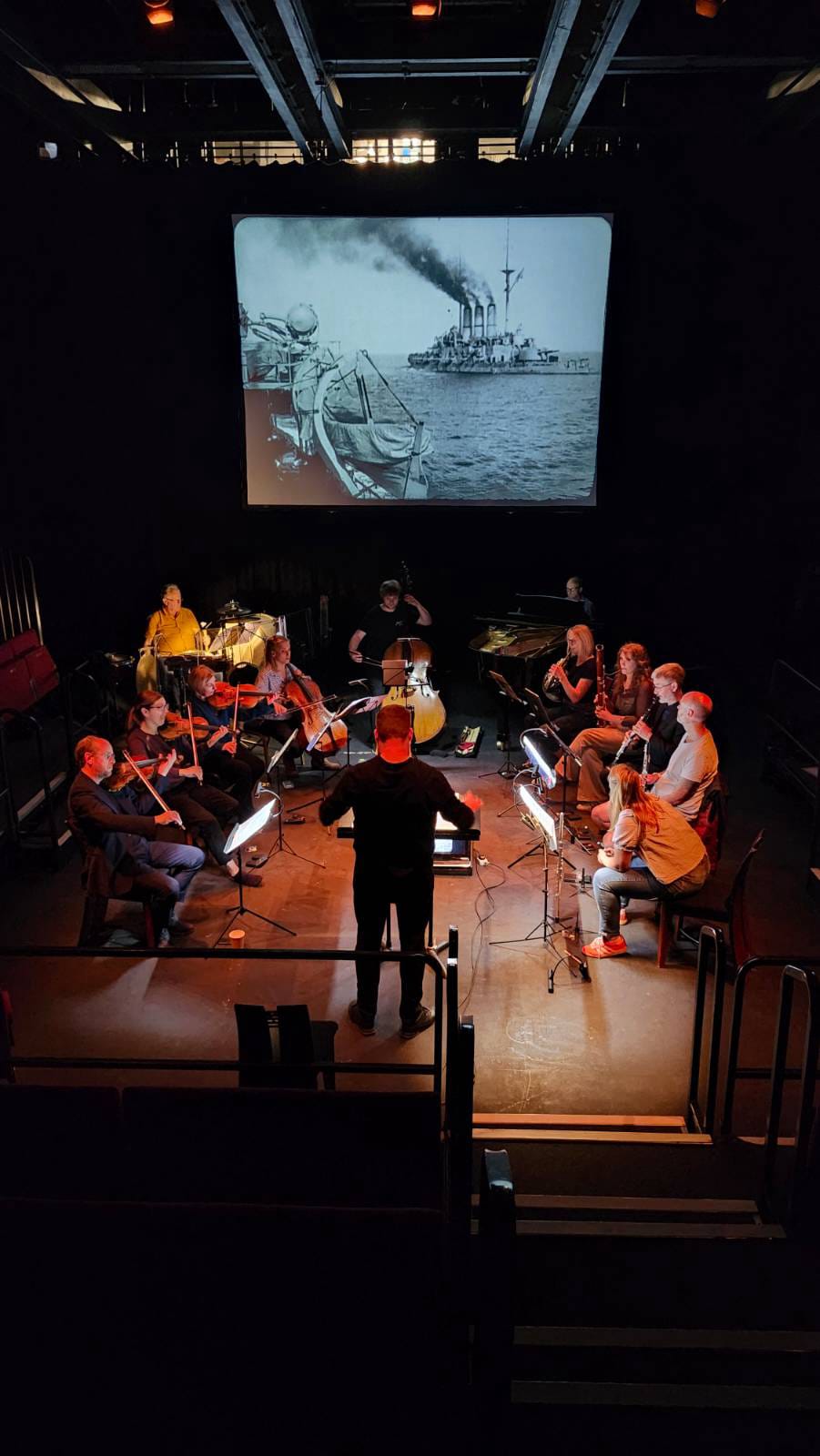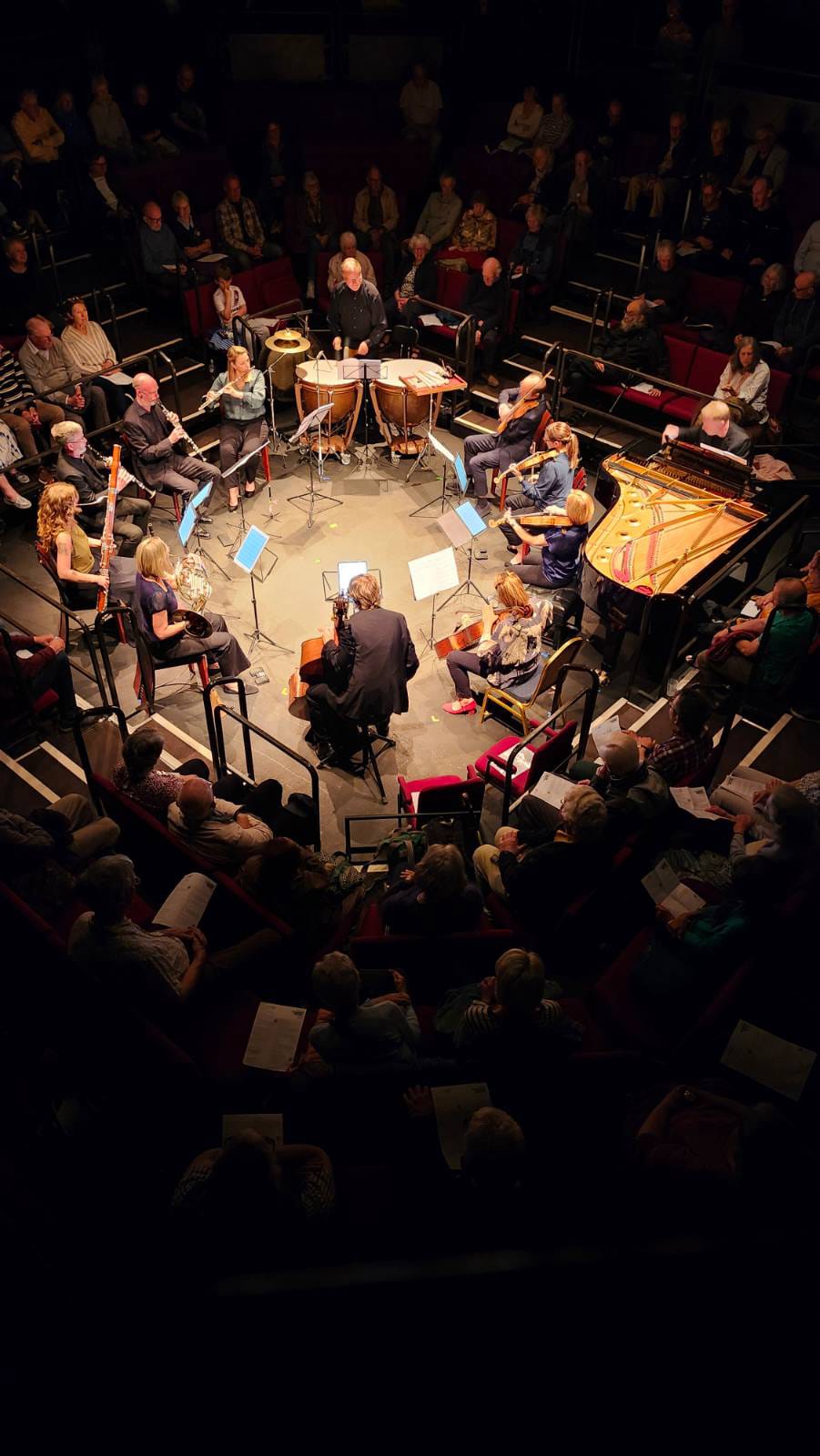
Edmund Meisel (arr. Morton) Battleship Potemkin
Last year, Music in the Round celebrated 40 years, and included a performance of the film L’assassinat du duc de Guise with live music. This year upped the ante, with a realisation of Austrian-born Edmund Meisel’s music (in an arrangement by conductor George Morton) for Sergei Eisenstein’s classic Battleship Potemkin. While Eisenstein’s two-part Ivan the Terrible – with music by another Sergei, Prokofiev – might be more famous (and it is magnificent), Battleship Potemkin showed itself to be spectacular on its own merits.
The music was se as vital to enliven the film’s story. Commissioned to celebrate the 20th anniversary of the first Russian Revolution of 1905, the intent was to show the corrupt nature of a Tsarist regime as well as supporting Socialism. So it is that the film is set in 1905, on board the Imperial Battleship Potemkin.
Meisel had just twelve days to compose his score. Eisenstein asked Meisel to include revolutionary songs from both Russia and Europe (the ‘Marseillaise’ is unmistakable). Conveniently for Ensemble 360, he wrote for a group of 16-18 players (flute/piccolo, trumpet, trombone, harmonium, percussion, violins, cellos and basses). Meisel’s music seems grouped into various modes: Rebellion, Victory, and a Cossack march to the death. He has his own musical signature: definably of the Soviet era, and yet less grey, perhaps, than, say Shostakovich. Meisel went on to write music for Eisenstein’s 1928 film October (Ten Days that Shook the World).
Meisel’s achievement in Battleship Potemkin is his mastery of tension; his quieter moments are riven with angst and potential energy (a case in point is when we see the sleeping crew early on); dramatic, quiet trills later speak of discontent and upcoming revolt. There is a swaggering theme not too long after this that was brilliantly done by Ensemble 360 and George Morton.
Morton’s ability to match music to image was superb: the smashing of a plate, for example, is mirrored in the music, and how well it was done; a side-drum for a shot, too. was highly accurate. Some individual members deserve praise, not least Rachel Roberts’ viola solo as Vakulinchuk’s body is taken; there is no missing the funeral march thereafter.
Whether one knows the found material (Marseillaise, or the lesser-known French revolutionary anthem of 1792 La Carmagnole – ‘Dansons la carmagnole’ is the catchy refrain there) there is no denying that the mosaic Meisel creates in Morton’s reconstruction is complex and perfectly complements the on-screen action. Here’s La Carmagnole:
It is no accident Meisel’s music for Potemkin is known as one of the finest of all film scores. From the terror on the Odessa steps (reflected in the militaristic rage of the music) and the depiction of the ship’s engines in the relentless music (we see close-ups of the machinery in action as Meisel creates a huge build-up), to the feel-good, soaring, triumphalist melodies of the conclusion, as the Tsarist ships refuse to open fire on the revolutionaries, joining them instead, Meisel’s music is perfectly constructed and, really, inspired.
The film is divided into five acts: ‘Men and Maggots’ shows the conditions on-board and the maggot-infested food that leads to the rebellion. That uprising is led by Vakulinchuk (played by actor Aleksandr Pavlovich Antonov) . Those who refuse to eat the meat are victimised in the second act, ‘Drama on the Deck’ and are supposed to be shot. However, the riflemen revolt and take control of the ship. Officers are thrown into the sea, and a Priest is found (surely modelled on Rasputin?!), as is the the doctor who pronounced the meat fit for consumption. Act 3 (‘The Dead Man Calls Out’) finds the citizens of Odessa in sympathy with the crew; as the sympathy rises, we move to the fourth act (‘The Odessa Steps’) where Cossacks harass the crowd through an unstoppable march (a particularly memorable image is of a pram freewheeling down the steps). It is in the final act, ‘One Against All,’ that defeat is turned to victory when the Tsarist sailors refuse to open fire and instead show solidarity.
You can see the YouTube of this film, with Meisel’s music, here. But nothing compares to he lived experience of performers in the hall. George Morton’s achievement is immense here. His direction was always clear, his knowledge of the score understandably vast, co-ordination with the film superb.
Incidentally, the pressing of this film on the Eureka DVD label eschews Meisel’s music and substitutes Shostakovich; really, you need to see it with Meisel’s music, and hear his ‘voice’.

The final event I attended was the 2pm ‘Relaxed Concert,’ Appalachian Spring, wherein Ensemble 360 was joined by members of the Elias Quartet. There was a slightly expanded version of this in the evening, to include Richard Strauss’ Metamorphosen. In a bid to explore the idea of the relaxed concert (and not to miss my return train to London!) I heard Copland’s Appalachian Spring from just outside the theatre in one of the ‘relaxed spaces’. I did sit in the auditorium for the performance of Barber’s Canzonetta for oboe and strings (arranged Wilson), a late work beautifully played by the arranger, Adrian Wilson. The harmonies and, indeed, the slightly disturbed countermelodies do take us to a different sphere than the more famous Adagio. It was a beautiful performance. For many in the audience, how lovely it must be to hear these pieces so young (the event is particularly aimed at children). The performance of that Adagio (heard first) was simply lovely.
Here’s a video of a performance of the Canzonetta with rolling score:
… and what could be better than relaxing to Copland’s joyous Appalachian Spring, so full of melodies we all know so well? I can’t comment too much on this as I was lolling on a sofa in the foyer, but it did hit the spot.
Highlights of this few days in Sheffield??: The film, for sure, but it is Ajmone-Marsan’s Nono that was, for me, truly unforgettable. More Luigi Nono next year, perhaps? Maybe Tim Horton could give us … sofferte onde serene … ? Perhaps a Nono warm-up in one of his concerts at St John’s in my native Leytonstone? Horton’s next date at that venue, incidentally, is June 19 (1 pm, free) in a programme The Piano as Storyteller: From Haydn to Chopin: Haydn Piano Sonata in E flat, Hob.XVI:52; Chopin Three Mazurkas, Op. 59 and Piano Sonata No. 3.








